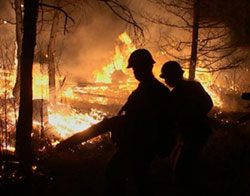|
为什么热水灭火更有效?(通讯员稿)
[ 2007-01-31 19:16 ]
某仓库发生火灾,消防队及时赶到,迅速投入扑救。可半小时过去了,消防车拉来的50立方米水仍未能将大火扑灭,当看到附近有只烧开水的大锅炉时,消防队员灵机一动,把大量热水浇到烈火上,奇迹出现,仅用9分钟火焰就被熄灭了。这是为什么呢?且看下文分解。
 As we know, the common ways of putting out a fire are cooling, stifling, isolating and restraining. Why is hot water better than cold water in putting out a fire? When hot water is sprayed on a fire, it not only cools whatever is burning, but also reduces the oxygen surrounding it because of the steam created. Once the fire is out of oxygen, it will be quickly brought under control. These layers of steam make a large-scale stifling effect so that the fire is quickly extinguished. As we know, the common ways of putting out a fire are cooling, stifling, isolating and restraining. Why is hot water better than cold water in putting out a fire? When hot water is sprayed on a fire, it not only cools whatever is burning, but also reduces the oxygen surrounding it because of the steam created. Once the fire is out of oxygen, it will be quickly brought under control. These layers of steam make a large-scale stifling effect so that the fire is quickly extinguished.
Relevant data shows that when the steam in the air adds up to 35% or the oxygen in the air is reduced to 17%, the fire will go out. Even the largest fire will be extinguished. It is clear that putting out a fire with hot water is much better than using cold water. Research shows that using boiling water to put out a fire is five times better than using hot water, and ten times more effective than cold water. In tests, one liter of hot water per second had the same effect as 20 to30 liters of cold water per second. If using boiling water, five firefighters can finish the work of ten using cold water. Using hot water to put out fires is very useful and should be widely implemented, but when putting out the fire, people must be careful not to be scalded by the boiling water.
(北京林业大学通讯员黄典钰供稿 英语点津 Annabel 编辑)
|